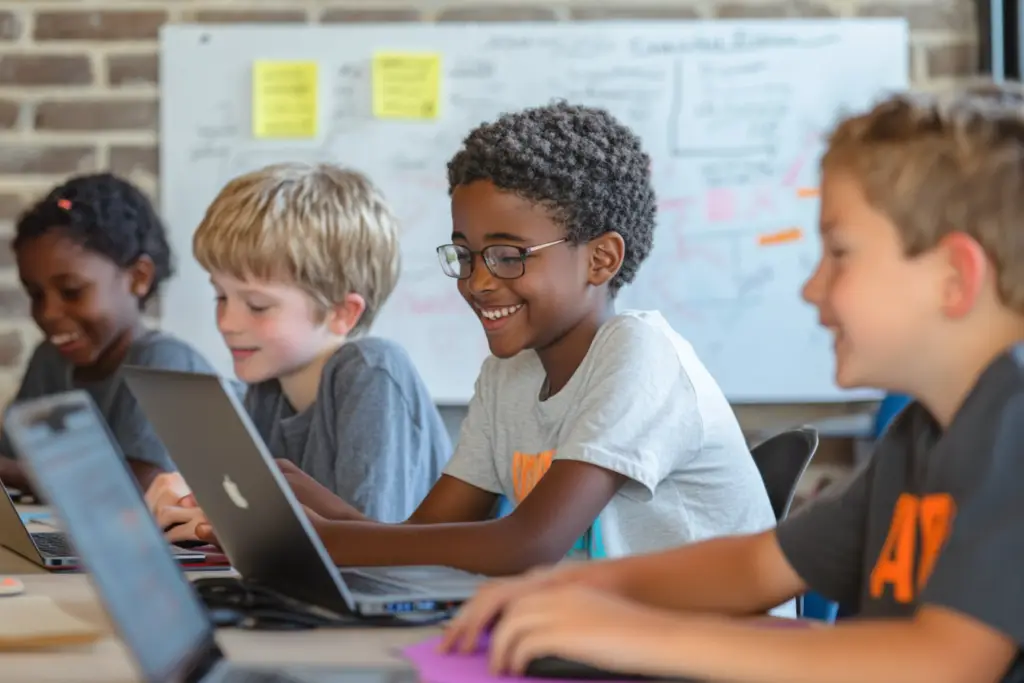Coding for kids. Is it relevant? In a world that’s changing so quickly, with new technologies like artificial intelligence (AI) and chatbots becoming part of our everyday lives, it’s natural to wonder what skills our children will need for the future. As someone who’s deeply committed to helping young people learn about technology through GetMeCoding.com, I’ve seen how learning to code can be a truly transformative experience.
It’s not just about keeping up with the latest trends; it’s about giving our children the tools to become thoughtful, creative leaders in a world that’s evolving at a breathtaking pace.
The Role of AI and Chatbots in Our Lives

Today, AI and chatbots aren’t just fascinating concepts; they’re tools that we interact with every day. From the helpful bots that guide us through customer service to the advanced AI systems that make predictions and even help drive our cars, these technologies are reshaping the way we live and work. But as exciting as these developments are, they also bring an important question to the forefront: How do we prepare our children for a future where AI is all around us?
Understanding AI and chatbots is important, of course, but it’s just one piece of a much larger puzzle that seems to be constantly changing at this point. The real magic happens when our children learn how these technologies work – and that journey begins with coding.
The Power of Human Creativity

While AI and chatbots are incredibly smart, they have their limits. They can only do what they’re programmed to do, and they don’t have the same ability to think creatively or empathize as we do. This is where the human touch – our creativity and problem-solving skills – becomes so important.
Through GetMeCoding.com, I’ve had the joy of watching young minds use coding to bring their own ideas to life – ideas that no AI could ever imagine. Whether it’s creating new apps or coming up with solutions to real-world challenges, coding empowers kids to think in ways that are uniquely human.
I can recall a story a few years ago of a dad and son coming together on a coding project and being recognized by ESPN’s podcast. This was creativity and love at it’s best in my opinion.
Why Coding Matters for Young Minds
Coding is much more than just a technical skill; it’s a whole new way of thinking. When children learn to code, they’re learning how to break down complex problems, think logically, and come up with creative solutions. It’s about nurturing a mindset that’s curious, inventive, and resilient.
And the beauty of coding is that the skills it teaches go far beyond technology. Coding helps kids develop critical thinking, collaboration, and communication skills – all of which will serve them well, no matter what path they choose in life. I would like to repeat that….NO MATTER WHAT PATH THEY CHOOSE in life.
At GetMeCoding.com, we’ve seen children blossom with confidence as they learn to code. They start to see themselves not just as learners, but as creators and problem-solvers, ready to take on any challenge that comes their way.
Research That Supports Learning to Code
Research strongly supports the benefits of learning to code for children, showing it enhances both cognitive and practical skills essential for their development.
- Boosting Executive Functions: Studies have demonstrated that coding activities improve children’s executive functions, particularly in areas like planning and response inhibition. In one study, children who engaged in coding lessons showed greater improvements in these areas compared to those involved in traditional STEM activities(Frontiers).
- Cognitive Skills Development: Learning to code helps develop critical cognitive skills, including problem-solving, logical reasoning, and metacognition. A meta-analysis found that coding had a medium to strong positive effect on these skills, particularly in creative thinking and mathematical problem-solving(Frontiers).
- Transferable Skills: Coding teaches children how to break down complex tasks into manageable steps, which enhances their ability to tackle challenges across different domains, not just technology. This skill set is highly transferable to other areas such as mathematics, science, and even everyday decision-making(Raise Smart Kid)(Frontiers).
- Fostering Creativity and Persistence: Coding also encourages creativity as children learn to design and build projects, which often requires improvisation and out-of-the-box thinking. Additionally, coding teaches perseverance, as children must troubleshoot errors and persist in finding solutions(Raise Smart Kid).
Coding: A Language for the Future
In today’s interconnected world, coding is like a universal language. It bridges cultures and countries, creating opportunities for people everywhere. Just as learning a new language can open up new horizons, learning to code can unlock a world of possibilities.
As we look to the future, it’s clear that technology will play a central role in shaping our world. Whether it’s developing new software, addressing climate change, or advancing healthcare, coding will be at the heart of these efforts. By learning to code, our children aren’t just preparing for future jobs; they’re preparing to be the leaders and change-makers of tomorrow.
Keep being curious,

Let Me Help You

If you are a teacher or someone looking to help others learn to code, let me help you.







